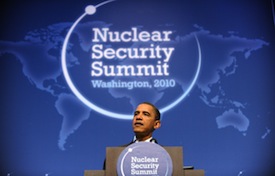Taking Stock of the Obama Administration Nuclear Policy
October 8, 2010
Featured Image
Today's top nuclear policy stories, with excerpts in bullet form.
Stories we're following today: Friday October 8, 2010.
Has President Obama Lived Up To His Nobel Prize? - Corey Flintoff for NPR [link]
- In the year since Barack Obama received the Nobel Peace Prize, work on the president's foreign policy agenda has been a hard slog, and many of his signature initiatives are a long way from being fulfilled.
- In the citation for Obama's award, the Nobel Prize committee said it "attached special importance to Obama's vision of, and work for, a world without nuclear weapons."
- Joe Cirincione, president of Ploughshares Fund, says: "Everything has been harder and gone slower than we had hoped, but he's made steady progress."
- Cirincione says Obama has scored successes in several arenas of nuclear policy, notably the new START agreement with Russia to reduce nuclear warheads, missiles and launchers. But the treaty faces opposition in the Senate.
- "Probably the president's biggest, most dramatic success has been the Nuclear Security Summit in April," Cirincione says. The summit brought together international leaders and got them to agree to a 4-year plan that the president said would secure all the world's nuclear weapons from terrorists.
- Obama also has succeeded in getting the international community to impose tougher sanctions on Iran. Cirincione says the latest international sections are biting Iran's financial sector, leading to "all kinds of rumors that the Iranians are making overtures to talk."
Is the Obama Administration Retreating from its Nuclear Non-proliferation Promise - Josh Rogin of "The Cable" [link]
- Top administration officials will meet at the White House on Friday for a "deputies committee" meeting to square off on how to handle ongoing negotiations over two pending civilian nuclear agreements, one with Vietnam and another with Jordan.
- Two opposing camps within the administration, led by Deputy Secretary of State Jim Steinberg and Deputy Secretary of Energy Dan Poneman, respectively, will debate the key issue of whether to insist that these agreements, which would allow greater nuclear technology cooperation with the United States, must include restrictions that would prevent the two countries from enriching uranium or reprocessing plutonium, activities that are sometimes employed to produce fuel for nuclear weapons.
- The Obama team celebrated [the UAE nuclear deal's prohibitions on enrichment and reprocessing] and called the agreement the "gold standard" for all civilian nuclear agreements, but then hit a wall when Vietnam refused to agree to the same prohibitions.
- "Unfortunately, people are calling it the gold standard, but the reality is that's unlikely to hold up," said Sharon Squassoni, director of the proliferation prevention program at the Center for Strategic and International Studies.
- A bipartisan and bicameral group of lawmakers wrote to President Obama on Aug. 26 urging him to include ENR restrictions in the Vietnam 123 agreement. Referring to the UAE standard, the lawmakers said that, "Failure to include similar restrictions in any deal with Vietnam could work against U.S. leadership and credibility on non-proliferation at a time when both are needed."
- It's extremely unlikely that Congress would move to prevent the 123 agreements with Vietnam and Jordan from going forward if they are sent to Capitol Hill without the ENR restrictions.
Russia to Refund Iran for Cancelled S-300 Sale - Laura Rozen of Politico [link]
- In a move the Obama administration highlighted as a sign that Russia is once and for all canceling the sale of sophisticated anti-air missiles to Iran, Russia announced Thursday that it will refund Iran the down-payment it paid for the S-300 air defense system.
- "Medvedev signed a decree last month banning supplies of S-300 missiles and other arms to Iran in a long-awaited move after weeks of deliberations by Russian officials," the AFP reported. "Under the decree, supplies of any tanks, fighter jets, helicopters, ships and missile systems are forbidden."
- The Russian announcement that it would refund Iran is among the strongest statements yet that Russia intends to undo the deal -- although Chemezov said it was unlikely all the money would be returned by the end of the year.
North Korea Pressing Forward on Nuclear Program, Report Says - John Pomfret of The Washington Post [link]
- North Korea appears to be moving forward with a program to enrich uranium for nuclear weapons, a development that would enhance its ability to produce bombs and sell its nuclear weapons technology abroad, according to a report to be released Friday.
- The report, "Taking Stock: North Korea's Uranium Enrichment Program" by the Institute for Science and International Security, based on information gleaned from intelligence agencies, government officials and media reports, concludes that North Korea "has moved beyond laboratory-scale work" and is now capable of building a "pilot plant" of centrifuges to enrich uranium.
- David Albright, a co-author of the report, said that based on data about North Korea's purchases of equipment around the world, he believes the North could possess 500 to 1,000 centrifuges.
- "A growing concern," the report added, "is that North Korea would provide centrifuge equipment, facilities, and technical know-how or even HEU [ highly enriched uranium] to other countries or groups."
- The Obama administration has held no significant talks with the North since taking office. U.S. officials have said that they want to let South Korea dictate the pace of any new talks and that both countries and Japan want to see North Korea take significant steps to undo its nuclear program before any new negotiations begin.
Nuclear Terrorism: Proof of Concept - Belgian Peace Activists locate and film nuclear weapons shelters within Kleine Brogel Air Base.



